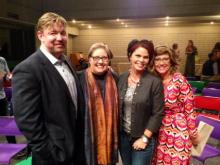
A COUPLE years ago, when net neutrality (the principle that internet service providers must treat all websites equally) was threatened by the U.S. Federal Communications Commission (FCC), Facebook stood firmly in its defense. Google, Netflix, Amazon, Twitter, and other high-tech giants took the same stand. Companies that make their money providing content or mining data from web users need net neutrality in order to function.
This February, India’s equivalent of the FCC, their Telecom Regulatory Authority, had to decide an important net neutrality test case there. A huge, U.S.-based multinational came into the Indian market offering an internet connection that limited users to the parent company’s own site and a severely limited menu of other pre-selected sites. This company spent millions on an advertising campaign against the principle of net neutrality in India. But finally Indian regulators stood firm and net neutrality was upheld.
The strange twist here is this: The U.S.-based Goliath fighting net neutrality in India was Facebook.
An obvious conclusion here would be that Facebook thinks net neutrality is only good for rich countries. Indians must be too poor, too ill-educated, maybe even too brown to handle the freedom and responsibility that comes with an open internet. That impression was confirmed when a member of Facebook’s board of directors, venture capitalist Marc Andreessen, went on Twitter to proclaim: “Anti-colonialism has been economically catastrophic for the Indian people for decades. Why stop now?”

The meeting comes as nations around the world fight a sometimes losing battle against the highly-skilled online outreach of the Islamic State, which has done a remarkable job of using social media to create recruitment and public relations materials to promote its efforts. Apple, Facebook, and Twitter said Thursday they will have representatives at the meeting.

The Oklahoma Bureau of Narcotics briefly used its official Facebook page on Aug. 26 to debate marijuana and the Bible. After two commenters posted references to the Bible in response to a story about the detrimental effects of marijuana on the brain, a bureau employee engaged them in a theological argument.
Joshua Lewelling, a medical marijuana legalization activist and retired Air Force veteran who lives in Inola, Okla., posted a reference to Genesis 1:29: “And I give you every seed-bearing plant to use for food for it is good.”
The response to Lewelling’s initial response rankled Lewelling because he believed the bureau was lecturing him about his own Christian faith.

Graham, president of the Billy Graham Evangelistic Association and the Samaritan’s Purse charity, describes Justice Sonia Sotomayor, the subject of his latest post, as the daughter of immigrants who made good on the American dream.
“Unfortunately,” the post continues, “she is also an example of someone who seems to be very misguided on the issue of same-sex marriage. She voted to strike down the federal Defense of Marriage Act in 2014, and homosexual advocates consider her an ally in their fight to make same-sex marriage the law of the land.”

In 1990, my father and pregnant mother packed up their life in suburban Illinois, bundled their four young children (including me) onto a plane, and landed in Romania to teach on a grant at the University of Bucharest.
The country was in the throes of revolution following the execution of ousted dictator Nicolae Ceaușescu, and the transfer of power was by no means tidy or complete. The Securitate — one of the most brutal secret police forces in the world — proved difficult to shut down. All our neighbors operated under the assumption that their every move continued to be watched (one friend had taken apart his typewriter by hand and hid it so he could answer honestly that he did not keep a typewriter in the house). Being American, my parents were told to expect our apartment to be bugged.
Freedom had come, but the systems of omnipresent control proved psychologically hard to shake.
The specter of surveillance is an insidious tool. In the 1790s, British philosoper Jeremy Bentham developed a centralized prison model called the panopticon, in which every occupant is visible to a single guard. Most models, since adapted by prisons and schools around the world, leave open the possibility that there is no supervisor watching after all. Whether there is isn't the point — the mere promise of one is enough to coerce significant behavior change. Being constantly observable is the trap.
These days, Americans don’t need a formative year spent in post-soviet Romania to feel uneasy about omnipresent surveillance. Edward Snowden’s revelations of massive secret surveillance programs operating under the NSA, with enormous access to private data from citizens not suspected of terrorism or criminal wrongdoing, rocked our understandings of data privacy and civil liberty. Now, as then, it’s reasonable to worry that we’re being watched.

Patricia Jannuzzi, the veteran Catholic high school teacher from New Jersey suspended for her anti-gay Facebook posts, will be reinstated immediately, school principal Jean Kline said in a letter.
Jannuzzi, a 33-year theology teacher at Immaculata High School in Sommerville, N.J., was forced to deactivate her Facebook page last month after several alumni started circulating screen shots of her sharply worded posts against gay marriage and gay rights. Two days later, the school placed her on administrative leave.
The letter to students and parents, quoting school director Msgr. Seamus Brennan states in part:
“Immaculata High School has reached an understanding with Mrs. Patricia Jannuzzi. It is the School’s position that a Catholic school teacher must always communicate the faith in a way that is positive and never hurtful. Tone and choice of words matter and I trust Mrs. Jannuzzi’s stated promise to strive always to teach in a spirit of truth and charity.”

God bless online media. Almost half of U.S. adults (46 percent) say they saw someone sharing “something about their faith” on the Internet in the last week.
And one in five (20 percent) say they were part of the Internet spiritual action on social networking sites and apps — sharing their beliefs on Facebook, asking for prayer on Twitter, mentioning in a post that they went to church.
“The sheer number of people who have seen faith discussed online is pretty striking,” said Greg Smith, associate director of religion research for Pew Research Center.
Megachurch pastors have mega-followings online. Joel Osteen of Lakewood Church streams his Houston services online. Rick Warren of Saddleback Church has 1.8 million likes on his Facebook page. And Pope Francis has more than 4.6 million English-language followers, chiefly American, for his @Pontifex Twitter feed.

It was a gathering that would have been unthinkable just five years ago.
On a cool summer evening, in a borrowed classroom overlooking San Francisco Bay, about 150 men and women gathered to screen a short documentary about a Mormon family whose 13-year-old son came out as gay.
The Montgomerys, who accepted their son and his news, were ostracized by church members, some of whom refused to accept Communion distributed by the young man in church. Like many conservative Christian denominations, the 15 million-member Church of Jesus Christ of Latter-day Saints bans homosexual activity and considers it grounds for exclusion from Mormon rites, rituals and even the afterlife.

I was scanning my Facebook news feed when I read articles about murders in Iraq.
It seems Islamic extremists in Syria are using beheadings and crucifixions to intimidate opponents. Photos and videos look eerily like scenes from illustrated Bibles.
I read about right-wing hate speeches on the steps of the Massachusetts State House in Boston, stirred by opposition to immigrants but proceeding on to everyone else they hate.
I read about gay bashing in the military. Anti-Semitism in Europe. Domestic violence in Baltimore. And on and on.
I have two responses. First, I applaud those who post such things on Facebook. Cat pictures are fine, but if this ugliness is going on in our world, we need to know about it.
Second, has humanity entered some new depth of degradation? Or do we just know more?

I’VE BEEN SPENDING a lot of time with my credit card company lately. Nice people work there, of course, and I try to make every phone call a time of conviviality and respect. It’s what good people do.
Credit card guy: Sir, my name is Brian, and ...
Me: No, it’s not.
“Brian”: I beg your pardon?
Me: Be honest. They give you anglicized names to sound more American, right? So when did you get that name?
“Brian”: When I was born. It’s also my father’s name.
Me: And, you’re calling from, like, Mumbai or ...
Brian: Texas.
Me: [awkward moment of silent self-loathing, mercifully cut short by seeing a butterfly. Pretty.]
But you readers understand my point. American jobs should be for Americans. Honest, God-fearing Americans who embody the spirit of freedom and entrepreneurship. Like the guy in Kansas who, according to Brian, had just purchased an iPad with my credit card number. Brian was calling from Texas to make sure this was okay with me, which it wasn’t.
Don’t get me wrong. I’m all for buying an iPad or any of the high-tech gadgets that I’ve had my eye on. And I totally get that the guy in Kansas feels the same way. In fact, I was cool with him right up to the point where he decided to keep it for himself.

I was born in 1990. That puts me squarely in the middle of what is referred to as the millennial generation.
It also, apparently, makes me a lazy, entitled, narcissist who still lives with my parents.
But that’s beside the point. What’s more important about the date of my birth is that it places me at a distinct and pivotal point in human history: I grew up with the Internet — what they call a “digital native.”
I (vaguely) remember when the Internet got popular; having slow, dial-up that made lots of crazy noises whenever you wanted to use it; talking to other angsty teens on AOL Instant Messenger (“AIM”); downloading music on Napster and Kazaa; and then, slowly but surely, having the Internet became engrained in my everyday life as if it was there the whole time.
But, like the bratty sibling I grew up with (upon reflection, I was equally, if not more, bratty — #humility #perspective), I’ve recognized that I have a love/hate relationship with the Internet. It’s a game-changer for the human experience, so, like that sibling, I think I’ll always love it. But, for every positive, innovative element of the Internet there is an equal and opposite reaction.

Thousands of Iranian women are sending photos of themselves without their hijab, or veil, to a new London-based Facebook page dedicated to allowing them “stealthy freedoms.”
The Facebook page — called “Stealthy Freedom of Iranian Women” — was set up by Iranian journalist Masih Alinejad and has attracted almost 150,000 likes.
Alinejad told the Guardian, which first reported about the site, that she has been inundated with messages and photos since launching it May 3.
“I’ve hardly slept in the past three days because of the number of pictures and messages I’ve received,” she told the newspaper.
The photos show women — sans veil — in parks, on the beach, or on the street.

Religion has, for centuries, been fairly obsessed with the afterlife. For some, what awaits us after our physical death is fairly central to their faith. But thanks to the Internet, many of us end up having a sort of life after death, whether we intended to or not.
In a recent article published in the New Yorker magazine, Pia Farrenkopf experienced the sort of digital life after death that some might find appealing, while others would consider it rather horrifying. Pia traveled frequently for work, so it was not unusual for her neighbors not to see her for long stretches at a time. They would mow her lawn when the grass got long and kept an eye on the place during her long stints out of town.
As such, she lacked many close ties near home, and like many of us, all of her monthly finances were automated and tied directly to her bank account. So although she died in early 2009 while sitting in her car in the garage, it was not until very recently that anyone actually discovered she was dead.
It took that long for her checking account reserves to run out, which led to utility shut offs and a visit from the bank to issue an eviction notice due to missed payments. So although her body had set partially mummified in the garage for nearly five years, as far as the outside world was concerned, she was still alive.
In his book, The Singularity is Near, Ray Kurzweil speaks of a not-so-far-off point in our future when the ability of computers to process information and replicate human thought and behavior will get to the point that we will question what it means to be conscious, and to be a person.
It seems like the stuff of science fiction, to consider the possibility of people uploading the entirety of their life experience, or even some iteration of what we understand to be their consciousness, to a network of computers. But the fact is that we already are wrestling with these sorts of ethical implications, even today.

Maybe it’s fitting that I was scrolling through my Twitter feed when I came across this very clickable headline from the AP: “Go Figure: Facebook Read Daily More Than Bible.”
Ouch. That one hits pretty close to home. That aimless scrolling through my Twitter feed could just as easily have been time well spent in front of the Good Book. Has my daily devotion to social media really eclipsed my daily devotion to spiritual practice?
After 10 years of operation, Facebook has usage stats that put it in the stratosphere of dedicated readers. Just over half of adults in the U.S. and Canada use Facebook daily. The same cannot be said for the Bible or other religious texts. Really, it’s not even close.
The AP story notes that Facebook “says worldwide it has 757 million daily active users. Of those, 19 percent are in the U.S. and Canada, so that's more than 143 million people checking Facebook daily.”
Compare that to these numbers from the same article about those who read a religious text every day: “A 2006 CBS News poll found 15 percent of U.S. adults read the Bible or other religious texts daily. There are about 267 million adults in the U.S. and Canada. That means about 40 million people reading the Bible daily.”
In a country where 79 percent of adults claim some sort of religious affiliation, less than a quarter of that number statistically reads their religious text daily. Historically the term “People of the Book” has referred to the Jewish people and their reverence for the Torah, their holy law. Perhaps those of us in the U.S. should call ourselves “the people of Facebook.”
Bad religious puns aside, personally, I’ve never been one to read my Bible with much consistency, and certainly not on a daily basis. While I’ve tried my fair share of daily Bible reading programs, plans, and even Bible apps, I’ve yet to develop the habit of daily reading.

ROME — It’s official, but no big surprise: Pope Francis is now the most-talked-about person on Facebook, according to information released Dec. 10 by the social media giant.
Pope Francis took the top spot, followed closely by Royal Baby George.

Facebook, with its nearly 500 million users, connects us to the world around us and we are able to share everything from vacation pictures to memorial pages for those who have died. The site has moved past its original intent of social networking between friends; businesses, churches, civil groups, clubs, and even TV shows all have a presence on Facebook. Breaking news is reported, shared, liked and commented on, all within the confines of one website. The goal has moved from friendly conversations to specific advertisements and mass information around like issues, causes, and beliefs.
But what has Facebook done for Christianity? Has it helped or hurt the Gospel message? Recently I began to see more and more pictures shared that read “Like if you Love Jesus” or “Keep scrolling if you love the Devil, like if you love God.” These pictures call for Christians around the world to share their faith boldly and proudly on their Facebook page so that all who may grace it will know that they are a follower of Christ.
To be honest, I can’t stand them.

Todd Starnes did not think he had violated Facebook’s community standards when he posted about “wearing an NRA ball cap, eating a Chick-fil-A sandwich, reading a Paula Deen cookbook and sipping a 20-ounce sweet tea” and generally being politically incorrect.
Workers at Facebook thought otherwise, blocking the host of “Fox News & Commentary” for 12 hours before issuing an apology.
Starnes and other conservatives say the incident is part of increasing viewpoint discrimination from organizations such as Facebook and Google. They want these new media companies to protect their freedom of speech.

I got fitted for a custom-tailored suit this week.
Not because I suddenly found a pot of money. I didn’t, and I didn’t need to. The cost for this Hong Kong tailor is comparable to what I have been paying for off-the-rack suits.
My problem is middle age. My shifting body type makes off-the-rack suits too wide in the shoulders and too long. It’s proof that life keeps on changing, and that the way forward must include getting unstuck from old ideas.

One odd way that we all keep up with the Kardashians is in the extraordinary effort we put into maintaining our own personal “brand”. The reaction of Khloe to recent allegations of drug addiction against her husband, NBA player Lamar Odom, is a Kardashian case in point. In reporting on this newsworthy event (sarcastic sigh), Huff Post speculated as to why Khloe was continuing with business as usual, posting “booty shots” and making no reference to her husband’s problems. They asked, “Is the 29-year-old trying to avoid the harsh reality that her husband is struggling with drug abuse, or is she simply trying to keep up the family’s brand?”
Posturing like a Kardashian
We can all appreciate that Khloe might need some privacy from prying and judgmental eyes because you don’t have to be a Kardashian to want privacy when things go wrong. Who wants to be judged for our mistakes by gleeful critics and gloating rivals? When we err, we tend to hide our errors from others and all too often, from ourselves. We are as desperate to maintain our “brand” – our self-identities as flawless, perfectly good, failure-free paragons of virtue – as if we were the public face of a multi-million empire.
On my first Patriots’ Day in Boston, I was enjoying lunch with several colleagues when someone rushed into the restaurant: There had been an explosion at the finish line of the Boston Marathon. Moments later, caravans of ambulances and police cars raced, and the reports of casualties rolled in.
In the hours and days that followed, social media became for me, and many others, a sacred space to share our prayers and words of disbelief.